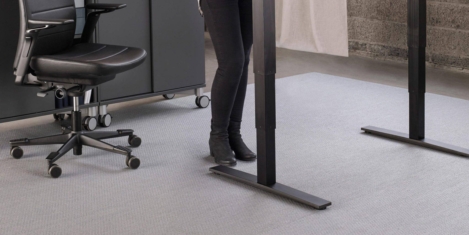October 10, 2017
Standing to work may be as good for our cognitive performance as it is our physical wellbeing
 Before we begin, the usual disclaimer that sitting is definitely not the new smoking and standing to work for long periods is just as bad as sitting. Having said that, a new study published in the Journal Psychological Science carried out by researchers at Ariel University and Tel Aviv University suggests that standing to work may improve cognitive performance as well as physical wellbeing. The study of 50 students carried out by Yaniv Mama, David Rosenbaum and Daniel Algom found that the mild stress associated with the effort of standing up improved the ability of participants to cope with simple mental tasks.
Before we begin, the usual disclaimer that sitting is definitely not the new smoking and standing to work for long periods is just as bad as sitting. Having said that, a new study published in the Journal Psychological Science carried out by researchers at Ariel University and Tel Aviv University suggests that standing to work may improve cognitive performance as well as physical wellbeing. The study of 50 students carried out by Yaniv Mama, David Rosenbaum and Daniel Algom found that the mild stress associated with the effort of standing up improved the ability of participants to cope with simple mental tasks.










 The majority (94 percent) of workers are open to flexible ways of working such as part-time, freelance, contract, temporary or independent contract work a new report from ManpowerGroup has revealed. Coining the trend as NextGen work, the research suggests this approach to a job is a choice (81 percent) not a last resort (19 percent). Findings from #GigResponsibly: The Rise of NextGen Work – a global survey of 9,500 people in 12 countries – identifies a shift towards this new way of getting work done, and that it works for people and employers. People were asked how they want to work, what motivates them and their views on NextGen Work. More control over their schedule (42 percent), boosting their bank account (41 percent) and developing new skills (38 percent) are top reasons why this flexible kind of work is on the rise. The report also found that this flexible approach is not just attractive to Millennials, as meaningful work and employer appreciation are valued more by Boomers than any other generation. More than 80 percent of US workers say NextGen Work is a choice, not a last resort, and builds resilience for less predictable futures.
The majority (94 percent) of workers are open to flexible ways of working such as part-time, freelance, contract, temporary or independent contract work a new report from ManpowerGroup has revealed. Coining the trend as NextGen work, the research suggests this approach to a job is a choice (81 percent) not a last resort (19 percent). Findings from #GigResponsibly: The Rise of NextGen Work – a global survey of 9,500 people in 12 countries – identifies a shift towards this new way of getting work done, and that it works for people and employers. People were asked how they want to work, what motivates them and their views on NextGen Work. More control over their schedule (42 percent), boosting their bank account (41 percent) and developing new skills (38 percent) are top reasons why this flexible kind of work is on the rise. The report also found that this flexible approach is not just attractive to Millennials, as meaningful work and employer appreciation are valued more by Boomers than any other generation. More than 80 percent of US workers say NextGen Work is a choice, not a last resort, and builds resilience for less predictable futures.


 With a plethora of reports around that generalise the behaviour of an entire generation of people, yet another exploration of the Millennial has to be approached with caution. But for this latest study, “The Millennial mindset: Work styles and aspirations of the most misunderstood worker”,
With a plethora of reports around that generalise the behaviour of an entire generation of people, yet another exploration of the Millennial has to be approached with caution. But for this latest study, “The Millennial mindset: Work styles and aspirations of the most misunderstood worker”, 



 The majority of UK employees (61 percent) do not feel encouraged by their employer to lead an active lifestyle, despite most managers agreeing that exercise positively impacts employees’ productivity (78 percent) and their ability to handle stress (82 percent) claims new research from AXA PPP healthcare. Of those British employees who do exercise after work, nearly half (46 percent) would prefer to do so before work but 79 percent blame a lack of time in the morning; yet for those who find time to be physically active before work, three quarters (75 percent) feel it spurs them on to be more effective in the morning while 69 percent feel more productive. More worryingly, nearly half of employees (45 percent) of employees admit they do not do the NHS recommended 30 minutes of daily exercise, five times a week, but finding time to be physically active during the working day can be difficult, or undesirable. Sixty?two percent of employees with good intentions to exercise at work find they’re cancelling their lunchtime exercise plans due to workload or work commitments.
The majority of UK employees (61 percent) do not feel encouraged by their employer to lead an active lifestyle, despite most managers agreeing that exercise positively impacts employees’ productivity (78 percent) and their ability to handle stress (82 percent) claims new research from AXA PPP healthcare. Of those British employees who do exercise after work, nearly half (46 percent) would prefer to do so before work but 79 percent blame a lack of time in the morning; yet for those who find time to be physically active before work, three quarters (75 percent) feel it spurs them on to be more effective in the morning while 69 percent feel more productive. More worryingly, nearly half of employees (45 percent) of employees admit they do not do the NHS recommended 30 minutes of daily exercise, five times a week, but finding time to be physically active during the working day can be difficult, or undesirable. Sixty?two percent of employees with good intentions to exercise at work find they’re cancelling their lunchtime exercise plans due to workload or work commitments.


 Cyber risk is becoming increasingly common while the types of breaches are becoming more diverse, claims a new white paper by the audit and accounting expert BDO. For instance, ransomware is now the fifth most common type of malware; with the cost of freeing up computer systems from ransomware tripling since 2016. Yet organisations are continuing to spend up to four times more on insuring other company assets (e.g. property, equipment etc.) than on cyber insurance, despite an increasingly widespread belief that their cyber assets are in fact up to 14 percent more valuable. The report also finds that as cyber incidents increase, they become more difficult – and therefore more expensive – to defend. In the new cyber insurance white paper, BDO’s global cybersecurity leadership group stresses the importance of businesses gaining an understanding of their unique risk profiles in order to ensure the right cyber insurance for their needs. Cyber insurance: managing the risk does include some of the positive trends around cyber security – for example, both the level of Board involvement and investments in cybersecurity have increased significantly in the last 2-3 years.
Cyber risk is becoming increasingly common while the types of breaches are becoming more diverse, claims a new white paper by the audit and accounting expert BDO. For instance, ransomware is now the fifth most common type of malware; with the cost of freeing up computer systems from ransomware tripling since 2016. Yet organisations are continuing to spend up to four times more on insuring other company assets (e.g. property, equipment etc.) than on cyber insurance, despite an increasingly widespread belief that their cyber assets are in fact up to 14 percent more valuable. The report also finds that as cyber incidents increase, they become more difficult – and therefore more expensive – to defend. In the new cyber insurance white paper, BDO’s global cybersecurity leadership group stresses the importance of businesses gaining an understanding of their unique risk profiles in order to ensure the right cyber insurance for their needs. Cyber insurance: managing the risk does include some of the positive trends around cyber security – for example, both the level of Board involvement and investments in cybersecurity have increased significantly in the last 2-3 years.








October 10, 2017
We (still) need to talk about mental health in the workplace
by Liam Butler • Comment, Wellbeing
(more…)